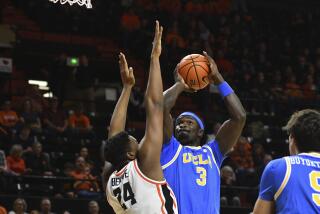Killum Dies Three Days After Stroke : Aftermath: Neurologist says the cause of player’s death might have been arteritis, an inflammation of the arteries. An autopsy will be performed today.
- Share via
Oregon State guard Earnest Killum, who recently said he was not afraid of dying, died Monday, three days after suffering a major stroke from a possible congenital artery disease.
Killum, California’s 5-AA player of the year at Lynwood High School in 1990, suffered his second stroke in six months Friday shortly before a scheduled practice with the Oregon State basketball team and an hour after he concluded what would be his final interview, with The Times’ Chris Baker.
During the interview, Killum said: “I don’t feel like I’m taking a chance playing basketball. I’m not worried about nothing happening to me at all. I’m young.”
He recently told the Long Beach Press-Telegram: “Dying? It doesn’t faze me. Anything could happen to me at any time.”
Killum, 20, had been listed in fair condition at Daniel Freeman Memorial Hospital in Inglewood Friday and Saturday, but was put on a respirator early Sunday when he lapsed into a coma. He was partially paralyzed on his right side, and unable to speak.
Carl J. Orfuss, a Daniel Freeman neurologist, said Monday that he believes Killum suffered from a disease called arteritis, an inflammation of the arteries. Orfuss said he discovered Monday afternoon that two of Killum’s relatives died at young ages under similar circumstances.
An autopsy will be performed today to determine the cause of death.
Orfuss said that participating in basketball did not have any affect on Killum, a 6-foot-4 player who was academically ineligible last season. Killum suffered a minor stroke last July at a Watts park and received medical clearance to play Dec. 27.
Oregon State officials drafted a letter of understanding that Killum signed before competing. Dutch Baughman, Oregon State’s athletic director, said the letter was not legally binding.
“It was not a waiver,” he said Monday. “We saw ourselves outside that loop. We prepared a letter for Earnest to sign, to indicate what we understood and what he understood with statements from the doctors.”
Killum was being treated with a blood-thinning drug, Coumadin, to control what was believed to be a blood-clotting disorder. The medication was reduced to allow him to play without suffering the side effects, mainly bruising easily. Orfuss said Monday the drug did not contribute to Killum’s death.
Killum played Thursday night against USC, scoring 13 points in 16 minutes. The night before, he was honored at Lynwood High School, where his number was retired.
“The precipitating event on Friday most likely was an occlusion of the left internal carotid artery, which caused the major stroke and the subsequent swelling of the brain,” Orfuss said at a news conference at Daniel Freeman.
Although it was originally thought Killum suffered from a blood-clotting disease, Orfuss said none of the tests taken after the first stroke showed such a disorder. He also said a battery of cardiac examinations showed little sign of heart problems.
Orfuss said Killum died because of a complete closure of the left carotid artery. He said this happened because of the progression of a systematic disease affecting the blood vessels.
“He had the benefit of every clotting test known to man,” Orfuss said. “(We) reviewed the records, and there is no other test that could have been done to make a diagnosis of a clotting disorder.”
Baughman said he had not decided whether to cancel the Beavers’ home games Thursday against Washington and Saturday against Washington State. He said he will talk to NCAA officials to determine whether the players would be allowed to fly to Los Angeles to attend Killum’s funeral, and whether the games can be rescheduled. Funeral arrangements are pending.
“Knowing Earnest as well as I do, this is a case, and I know this sounds trite, but (he) would want us to play,” Baughman said. “He didn’t want to see anything prevent his chances of playing.”
Baughman, who flew to Los Angeles late Sunday, said about 20 relatives were at Killum’s bedside most of Monday. Killum’s mother, Thelma Woods, had stayed by her son since Friday. Nurses gave up their lounge to let Woods rest.
Among those at Killum’s side Monday were his father, Earnest Sr. of Atlanta; his sisters, Candice and Miko Woods; and his brother, Marcus Boyd, a sophomore basketball player at Dominguez High.
An hour after Killum was pronounced dead, Oregon State Coach Jim Anderson had not been informed. But he described the scene at the Beavers’ closed Monday practice: “Everybody is pretty depressed, so it was pretty hard to have a normal practice,” Anderson said. “We didn’t do a lot. We just held a walkthrough. Everyone is handling it in his own way.”
Members of the Oregon State team met late Monday night to talk.
Oregon State guard Canaan Chatman, Killum’s roommate, said: “Everybody’s going to be hurt by this. We’re going to continue to play hard because I’m sure that’s what Earnest would want us to do. He wouldn’t want us to sit around and just mourn over him.”
Baughman, who is trained in grief therapy, said he was not sure whether he would be able to handle all the counseling of team members. But he said he would try.
“On behalf of Oregon State, we wish to extend our deepest and most sincere condolences to Earnest’s family,” Baughman said. “We are sure that the OSU basketball team and all others who have had the privilege and joy to know Earnest are also deeply saddened by this great loss.”
Later, in a private moment, Baughman said: “I didn’t expect to come down here to be talking about this.”
Killum’s family did not want to discuss the death. One cousin said that the family was too grief stricken to say anything.
Times staff writer Chris Baker contributed to this story.
OTHER STORIES: C6
More to Read
Go beyond the scoreboard
Get the latest on L.A.'s teams in the daily Sports Report newsletter.
You may occasionally receive promotional content from the Los Angeles Times.










